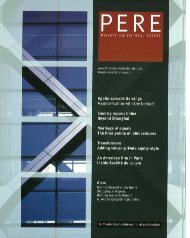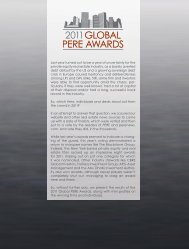2010AWARDS & AnnuAL REVIEW - PERE
2010AWARDS & AnnuAL REVIEW - PERE
2010AWARDS & AnnuAL REVIEW - PERE
Create successful ePaper yourself
Turn your PDF publications into a flip-book with our unique Google optimized e-Paper software.
Political football<br />
An excerpt from <strong>PERE</strong>’s uK roundtable in May found participants fearing the<br />
consequences of a hung parliament, which is precisely what happened<br />
Politics was on the minds of the participants in <strong>PERE</strong>’s UK<br />
Roundtable, which took place in May as the country was set to<br />
go to the polls to vote on the next government.<br />
The common fear was the continuation of a stagnating economy<br />
by a hung parliament, whereby no one party could govern<br />
outright as it lacks an overall majority vote. As things turned<br />
out, their worst fears were confirmed as a collation was formed<br />
between a Conservative party and the Liberal Democrats.<br />
“A hung parliament is what we don’t want,” said Paul White,<br />
managing director of Frogmore Partners. “All we’ll see is another<br />
election within 12 months and, in between that, politicians<br />
will try to score points off of one another. This will be economically<br />
unhelpful to us.”<br />
As the old saying goes, every cloud has a silver lining, and<br />
MGPA’s Alex Jeffrey, who is now chief investment officer of the<br />
firm, already was thinking about opportunities stemming from<br />
a government in need of producing capital receipts to reduce its<br />
debt. “Whoever wins will be downsizing the government’s real<br />
estate footprint, whether it was occupational space or ownership,”<br />
he said. “The SW1 estate (the government’s most prominent<br />
London postal code) will be reduced in size, there will be<br />
decanting of staff and the sale of assets.”<br />
As it happens, in February of this year the government ap-<br />
White, Jeffrey and Hodcroft: playing politics<br />
peared to head down such a path with the appointment of advisers<br />
by the Government Property Unit to help it establish property<br />
vehicles to own and manage up to 65 million square feet of<br />
government offices in London and Bristol.<br />
Such interest in the government wasn’t the result of no viable<br />
assets to buy, rather a lingering bid-ask mismatch. “We have<br />
seen a pipeline of £30 billion a year since 2006,” White said.<br />
“This year, I think we are seeing between £500 million and £600<br />
million of assets a week, so we can’t say we aren’t seeing stock.<br />
We are just not seeing stock at a price we want to pay.”<br />
The resurgence of Germany<br />
in an excerpt from <strong>PERE</strong>’s German roundtable in november, five professionals discussed<br />
the renaissance of the German economy and the state of its real estate markets<br />
Maybe it is because German<br />
nationals are conservative<br />
by nature or because<br />
they have survived<br />
economic shocks before<br />
or because they are simply<br />
wary of past mistakes,<br />
but local real estate players<br />
were restrained over<br />
the country’s remarkable<br />
economic strength when<br />
<strong>PERE</strong> caught up with<br />
them in November.<br />
There was plenty of<br />
OpernTurm, Frankfurt: sign of the times reason for cheer as the<br />
German Council of Economic<br />
Experts had just announced that the German economy<br />
was showing 3.7 percent growth in 2010 and was forecasting<br />
2.2 percent growth for 2011. Still, Matthias Hünlein of Tishman<br />
Speyer, Ralf Kind of Barclays Capital, Michael Schleich of<br />
GREAT German Real Estate Advisory Team, Collin Schmitz-<br />
Valckenberg of Orlando Real Estate and Ralph Winter of Corestate<br />
Capital refused to get carried away.<br />
As Hünlein pointed out, part of the cautious German psyche<br />
has to do with a focus on savings and not getting too carried<br />
away by indicators. “Germany has gone through a number of<br />
difficult situations where people had to rebuild wealth,” he noted.<br />
Instead, the participants were focused on a raft of issues from<br />
local investor demand for core assets to the availability of bank<br />
finance to how Germany’s small public real estate sector is ripe<br />
for change. In addition, the current ‘play’ is more about investing<br />
in special situations, where one has to “work like hell”.<br />
Although investors were finding deals that made sense in the<br />
new economic environment, the participants said what would<br />
happen next in Germany was just as likely to be influenced by<br />
global investors as by locals ones. As evidence, they pointed to<br />
the acquisition of the Sony Centre in Berlin by South Korea’s<br />
National Pension Service for around €570 million in May.<br />
Furthermore, just a few weeks after the roundtable was held,<br />
the sale of the OpernTurm in Frankfurt was announced. It was<br />
sold to a joint venture between JP Morgan Asset Management<br />
and the Government of Singapore Investment Corporation.<br />
2010 AwArds & AnnuAl review | <strong>PERE</strong> 47







